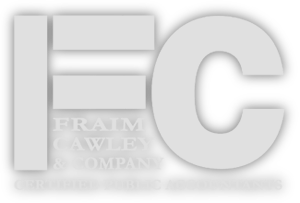2025 Update: while all of the information in this article is still valid, we have done a much more in-depth discussion of the issue that can be found here.
Most businesses eventually choose to incorporate in some form or fashion. This can have a number of benefits, both from a legal and a tax standpoint. However, the type of corporate structure – that is, which form of corporate entity to utilize – is one of the single most important planning decisions a business can make, and it is consistently one of the areas where I see the most misinformation given and mistakes made. Here are three examples of things I have encountered within the past month:
- A small, single owner company set up as a C-Corporation
- A business with $100k in profit operating as an LLC/being taxed as a partnership
- A small business with $5k in profit that had been advised to become an S-Corporation for the “tax savings”
In each of these instances, a mistake in formation structure was made. Somebody somewhere gave the business owner bad advice – or perhaps no professional advice was sought. What is the issue with each of these examples? Let’s take a closer look at the advantages and disadvantages of each of these entity types.
C-Corp
Wal-Mart, IBM, and other major corporations are C-Corporations. This is because business with: 1) more than one class of stock or 2) more than 100 shareholders are not given the option of S-Corp election. What are the benefits?
The stock is able to be widely (in the above examples, publicly) traded. This makes raising capital much easier and also makes the ownership readily transferrable. It allows for different classes of stock, which plays a major role when corporate decisions are at stake.
But the disadvantage to a C-Corp is severe. The corporation itself is taxed and then any earnings that are disbursed to shareholders – as dividends for example – are also taxed. In effect, double taxation. As small business owners, there are a select few circumstances that would warrant taking this tax hit. The above example (small company, one owner) was not one of them.
LLC
LLCs are probably one of the most popular entities for small business owners – and with good reason:
- They are easy to form
- They give the owner the benefit of limited legal liability (as do the other entities)
- If there is only one owner, they can be treated as a “disregarded entity”. This means they do not require a separate tax return and all income can be done on Schedule C of the 1040. This saves money on tax preparation and is an easier process
I actually like LLCs. There are a lot of circumstances where they are the most advisable approach. But they have one major disadvantage:<
- As a default, all of the earnings are considered self-employment income and are thereby subject to self-employment tax
I will go in more detail in the next section to explain why this can be an issue.
S-Corp
When possible and under the right circumstances, S-Corps are the “crème de la crème” of tax entities. They offer the same legal protection as the other entities but have one major advantage:
- Earnings in excess of the shareholder’s salary are not subject to self-employment tax
Please note: this is a discussion from a tax standpoint. It is possible to form an LLC or other corporate structure and elect S-Corp status for taxation purposes. In fact, I am actually in favor of LLCs over Incs in most cases for the legal setup, just not necessarily the tax setup. Let me use the second example above to illustrate. Assume that this person met the IRS qualifications for an S-Corp (and that they truly were an employee of the corporation and not using it to shield income), a reasonable salary for the profession/industry/area was determined to be $50,000, but the company made an additional $50,000 in profit. The self-employment tax is 15.3% (up until the point that you hit the Social Security cap). In this example, this is the difference in tax savings with an LLC (that has not elected S-Corp status) vs. an S-Corp:
| Income Subject to SE Tax | SE Rate | SE Tax Due | |
| LLC | $100,000 | 15.30% | $15,300 |
| S-Corp | $50,000 | 15.30% | $7,650 |
That’s a savings of $7,650, not in taxable income, but in actual tax to be paid! All from the correct entity choice and categorization of income.
That said, S-Corps are not ideal for everyone. Look at the third example above. The $5,000 business owner could not give himself reasonable salary of $500 and then take the rest as dividends. Every penny of it was subject to SE tax. In fact, it likely cost him extra money because an additional tax return had to be filed for the S-Corp. All in the name of “tax savings” that did not exist.
There is an old joke that if you ask an accountant any question, regardless of how rudimentary it may seem, he will always answer with “it depends”. There is a lot of truth in that. Every situation I run into is different. Every client has a unique set of needs, goals, and circumstances. The right course of action for nine clients would be wrong for the tenth.
That is why I always implore people to not just simply do what someone else did, but to take the time to sit down with their accountant and really talk through their personal situation to see what approach will be the most advantageous for them.
As always, if you have any questions whatsoever or would like to talk please visit me online at FraimCPA.com or call me at (540) 314-0345.
IRS Circular 230 Notice: To ensure compliance with requirements imposed by the IRS, we inform you that any federal tax advice contained in this communication (including any attachments) is not intended or written to be used, and cannot be used, for the purpose of avoiding penalties under the Internal Revenue Code.





Pingback: How Are Crypto Mining Profits Taxed? - Crypto Tax CPA - Micah Fraim
Pingback: Do I Qualify for Crypto Tax Trader Status? - Crypto Tax CPA - Micah Fraim
Pingback: How Are Art NFTs Taxed? - Crypto Tax CPA - Micah Fraim
Pingback: Are Crypto P2E (Play-To-Earn) Gaming Rewards Taxable?
Pingback: How Is Node Operator and Node Validator Income Taxed? - Crypto Tax CPA - Micah Fraim
Pingback: Cashing Out on Your Crypto Profits to Avoid Tax Catastrophes
Pingback: Bear Market and Crypto Winter Opportunities: Accelerate Income